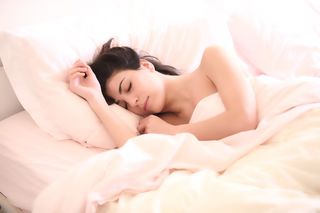Source: Claudio_Scott / Pixabay
It is scientific consensus that a good night’s sleep is essential to optimal health and functioning. There’s really no way around it.
But what’s the best way to maximize the quality of your sleep? New research forthcoming in the journal Psychological Science may have an answer.
Specifically, a team of researchers led by Marlise Hofer of the University of British Columbia examined whether exposure to the scent of one’s partner influenced sleep quality.
They found that it did.
“The scent of another person is emotionally evocative,” state the researchers. “We found that the exposure to the scent of a romantic partner overnight leads to improved sleep efficiency. Participants in our study experienced an average of more than nine minutes of additional sleep per night when exposed to the scent of their partner.”
While nine minutes per night might not sound like all that much, it equates to about an hour of recouped sleep per week and about 52 additional sleep hours per year. Considering that many Americans report sleep deficiencies (about 1 in 3, according to a CDC study), this should come as a welcome discovery.
To arrive at this conclusion, the researchers recruited 155 people to participate in a four-day sleep experiment. Participants were asked to sleep with their partner’s worn shirt on top of their pillow or with a new shirt on top of their pillow. The researchers then tracked sleep quality (as measured by self-report ratings, time in bed, and time asleep) over the four-day period and tested whether sleep improved among participants who slept with their partner’s worn garment.
Interestingly, they found that participants who slept with their partner’s worn shirt reported a higher quality sleep than those who slept with the new and “unscented” shirt—and that this effect occurred whether or not individuals were aware of their partner’s scent. They write, “Beliefs about the scent’s identity do not influence the positive impact of exposure to a partner’s scent on sleep efficiency. In other words, people sleep better when exposed to their partner’s scent regardless of whether they thought they were exposed to their scent.”
The researchers also found that women tended to have overall better sleep efficiency than men, and that scent cues benefited women marginally more than men—perhaps because women have a higher “need for security.”
The researchers hope that their work might popularize a useful technique for increasing sleep quality in couples, especially in today’s highly mobile society where travel is common.
They conclude, “Learning how naturalistic behaviors—that may be as simple as sleeping with a loved one’s worn article of clothing—affect sleep may help to eventually uncover the makings of a good night’s sleep.”
Hofer, M. K., & Chen, F. S. (2020). The Scent of a Good Night’s Sleep: Olfactory Cues of a Romantic Partner Improve Sleep Efficiency. Psychological Science, 0956797620905615.













